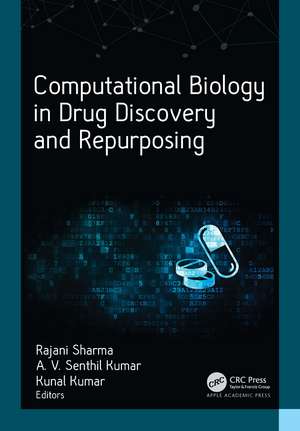Computational Biology in Drug Discovery and Repurposing
Editat de Rajani Sharma, A. V. Senthil Kumar, Kunal Kumaren Limba Engleză Hardback – 16 aug 2024
The book describes algorithms used for drug designing and the use of machine learning and AI in drug delivery and disease diagnosis, which are valuable in clinical decision-making. The implementation of robotics in different diseases like stroke, cancer, COVID-19, etc. is also addressed. Topics include machine learning, AI, databases in drug design, molecular docking, bioinformatics tools, target-based drug design, and immunoinformatics, chemoinformatics, and nanoinformatics in drug design. Drug repurposing in drug design in general as well as for specific diseases, including cancer, Alzheimer’s disease, tuberculosis, COVID-19, etc., is also addressed in depth.
Preț: 1591.18 lei
Preț vechi: 1674.93 lei
-5% Nou
Puncte Express: 2387
Preț estimativ în valută:
304.52€ • 316.32$ • 252.95£
304.52€ • 316.32$ • 252.95£
Carte tipărită la comandă
Livrare economică 03-17 februarie 25
Preluare comenzi: 021 569.72.76
Specificații
ISBN-13: 9781774915561
ISBN-10: 1774915561
Pagini: 478
Ilustrații: 99
Dimensiuni: 178 x 254 mm
Greutate: 1.04 kg
Ediția:1
Editura: Apple Academic Press Inc.
Colecția Apple Academic Press
ISBN-10: 1774915561
Pagini: 478
Ilustrații: 99
Dimensiuni: 178 x 254 mm
Greutate: 1.04 kg
Ediția:1
Editura: Apple Academic Press Inc.
Colecția Apple Academic Press
Public țintă
Academic and PostgraduateCuprins
PART 1: SCIENTIFIC APPROACHES TO DATA RETRIEVAL AND THE ROLE OF AI 1. Machine Learning for Drug Designing 2. Intervention of Artificial Intelligence in Disease Diagnosis PART 2: COMPUTATIONAL APPROACHES AND BIOINFORMATICS INFORMATION AND APPLICATIONS 3. Bioinformatics for Determining the Active Site of the Target Protein 4. Molecular Docking: A Pertinent Computational Tool in Modern Drug Designing and Discovery 5. Bioinformatics Tools to Study Homology Modeling 6. Target-Based Drug Designing 7. Immunoinformatics in Drug Designing 8. Chemoinformatics in Drug Designing PART 3: DRUG REPURPOSING 9. Drug Repurposing as an Emerging Field in Drug Designing 10. Databases in Drug Design 11. Computational Approach for Drug Repurposing PART 4: RESEARCH APPLICATIONS OF COMPUTER-AIDED DRUG DESIGNING (CADD) AND DRUG REPURPOSING 12. De Novo Drug Design Using Computational Tools: Inhibition of CoaBC for Tuberculosis Treatment as a Case Study 13. Role of Artificial Intelligence in Retrosynthesis Analysis of Natural Products for Drug Design 14. Drug Repurposing in the Quest for Newer Therapeutic Options against Cancer 15. Computational Approaches to Discover Novel Phytochemical Inhibitors Against Novel Coronavirus (SARS-CoV-2) 16. Insights into Computational Repurposing of Drugs for Alzheimer’s Disease 17. Drug Design and Discovery 18. Sodium-Proton Transporter Proteins: Clinical Significance as a Potential Drug Target 19. Nanoinformatics and Its Role in Drug Designing and Discovery 20. In silico Homology Modeling to Identify the Anti-Inflammatory Proteins from Raphanus sativus and Brassica olerecea
Notă biografică
Rajani Sharma, PhD, is Assistant Professor in the Department of Biotechnology at Amity University Jharkhand, Ranchi, India. She has published research papers, review papers, and book chapters as well as two patents, one national and one international. She is a reviewer for several journals, including Public Health Journal. She is a lifetime member of the Association of Microbiologists of India. Dr. Sharma has participated in a number of national and international conferences.
A. V. Senthil Kumar, PhD, is Director and Professor in the PG and Research Department of Computer Applications at the Hindusthan College of Arts and Science, Coimbatore, India. He has published book chapters, many papers in international and national journals and conferences, and nine edited books. He is Editor-in-Chief for the International Journal of Data Mining and Emerging Technologies and an editorial board member and reviewer for several other international journals. He is a key member of the Machine Intelligence Research Lab (MIR Labs).
Kunal Kumar, PhD, is Assistant Professor at the Amity Institute of Biotechnology, Amity University Jharkhand, Ranchi, India. Dr. Kumar has publications in research journals and book chapters to his credit to date. He has filed one national patent at the patent office of the Govt. of India. He has worked on core areas of enzyme technology and protein science.
A. V. Senthil Kumar, PhD, is Director and Professor in the PG and Research Department of Computer Applications at the Hindusthan College of Arts and Science, Coimbatore, India. He has published book chapters, many papers in international and national journals and conferences, and nine edited books. He is Editor-in-Chief for the International Journal of Data Mining and Emerging Technologies and an editorial board member and reviewer for several other international journals. He is a key member of the Machine Intelligence Research Lab (MIR Labs).
Kunal Kumar, PhD, is Assistant Professor at the Amity Institute of Biotechnology, Amity University Jharkhand, Ranchi, India. Dr. Kumar has publications in research journals and book chapters to his credit to date. He has filed one national patent at the patent office of the Govt. of India. He has worked on core areas of enzyme technology and protein science.
Descriere
An in-depth look at computational biology, which analyzes accumulated biological data collected from analysis of proteins, genes, and cell population for drug discovery. It covers the implementation of computational programming, bioinformatics, biotechnological techniques, and pharmaceutical chemistry in designing drugs.
